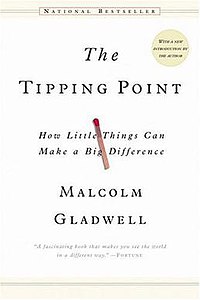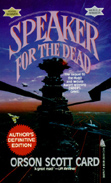ewee (02/26): The Tipping Point by Malcolm Gladwell
 Thanks to a bit of a cold, I had time to layabout and finish this book. Another quick read, but a bit disappointing. I have to give it some leeway, since it's been over 7 years since its original publication, so undoubtedly, some of the ideas in the book are bound to be dated or even already part of popular culture enough to have filtered through other media.
Thanks to a bit of a cold, I had time to layabout and finish this book. Another quick read, but a bit disappointing. I have to give it some leeway, since it's been over 7 years since its original publication, so undoubtedly, some of the ideas in the book are bound to be dated or even already part of popular culture enough to have filtered through other media.Hm, first, it was neither the truly scientific nor journalistic book that I was hoping it would be (Luckyduck aptly described it as "hand-waving"). What footnotes he included were interesting (tho at least one had a mathmetical/typographical error, but yes, that is a bit nitpicky). The book had some truly interesting ideas and references. But so often he resorted to generalizations and oversimplifications.
For instance, he framed the Goetz incident so firmly that it's no longer journalism, but clearly editorialism (but perhaps I'm foolish to expect journalism here?):
[After listing the previous convictions/crimes of Alley, Ramseur, Cabey and Canty, the four young men Goetz shot on the subway. Emphasis mine.]Gladwell then goes on to explain Goetz's upbringing and difficulty with authority, run ins with other young men (and of course, Gladwell mentions each time that the young men are black), and his application and denial for a gun permit (but no explanation of the reason why he was turned down, or how he managed to obtain a gun). Gladwell then mentions that Goetz mentioned in a community meeting that "The only way we're going to clean up this street is to get rid of the spics and niggers." Maybe I'm just being sensitive, but there does seem an element of racism and the possiblity of hate crime in all this.
"It's hard to be surprised when people like this wind up in the middle of a violent incident.
Then there's Goetz. He did something that is completely anomalous. White professionals do not, as a rule, shoot young black men on the subway."
Then he sums up this section with a bit of sympathetic editorial on Giuliani and Bratton, and makes the point that "you don't have to solve the big problems to solve crime. You can prevent crimes just by scrubbing off graffiti and arresting fare-beaters: crime epidemics have Tipping Points every bit as simple and straightforward as syphilis is Baltimore or a fashion trend like Hush Puppies."
Which is all very neat and simple, but seems to miss a very important point. What about the economic, class, and racial disparities that exist in our society that are at the base of so many of society's problems? Cleaning up the streets will not prevent people from going hungry at night. Crime wouldn't have such a hold on our society (no matter what Gladwell says), if people did not have to turn to alternative economies to survive.
Ok, ok, I'm being negative. Perhaps it's this head cold and sore throat that are making me grumpy (prolly not). Here's what I did like, and why I think this book is worth a read. Some of the studies are downright fascinating. It's science light, and not so well written, but there's stuff in there (the Stanford prison experiment, Sesame Street and Blues Clues, viral and direct marketing) that provide some interesting mental fodder. In addition to that, I get a sense that his ideas (7 years ago) were truly revolutionary from a business standpoint, and I probably take some of what he has to offer for granted.
So, yes, the paperback is worth a read. But borrow it from the public library and save the cash.
Labels: ewee




